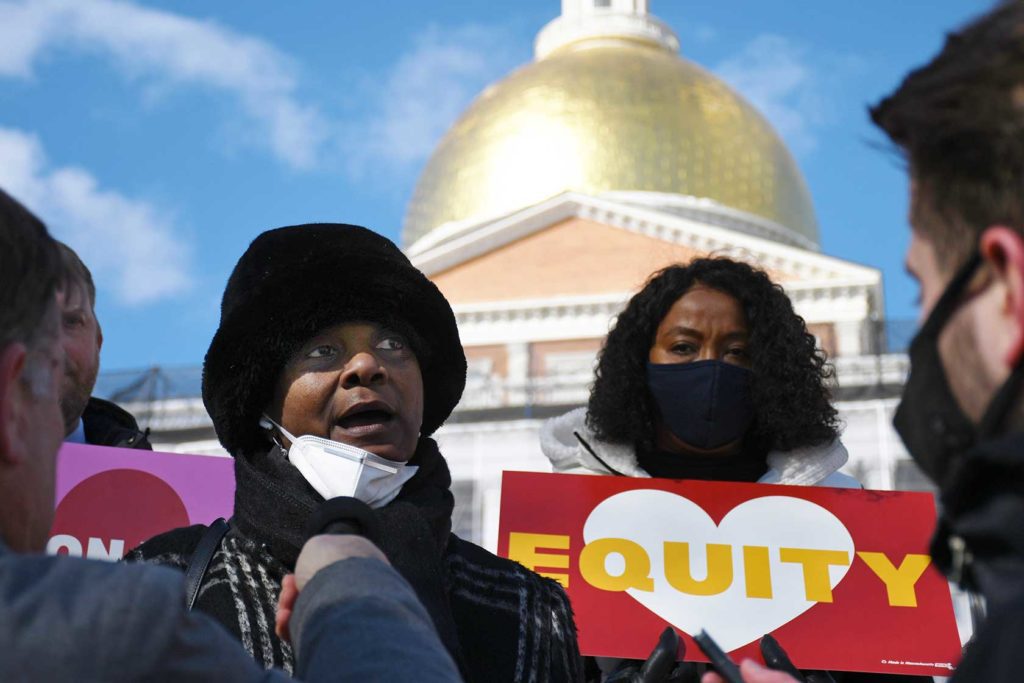Coalition pushing for Election Day registration
Senate passes bill, House members stall on measure

Members of the Election Modernization Coalition gathered Monday to call on the state Legislature to include Election Day registration in voting legislation currently moving through the Senate and House of Representatives.
In a press conference in front of the State House, representatives from the coalition’s organizations said Election Day registration was “common sense,” calling it a key equity element of the Voter Opportunities, Trust, Equity and Security Act (VOTES Act), which also tackles mail-in-voting, early voting, and voting from correctional facilities and jails.
“All these provisions in the VOTES Act that have passed both the Senate and the House are very strong, but we know that the real game-changer, the real equity piece, the heart of the VOTES Act, is Election Day registration,” said Geoff Foster, executive director for Common Cause Massachusetts.

State Rep. Nika Elugardo speaks to reporters as Massachusetts Voter Table Executive Director Beth Huang looks on. PHOTO: AVERY BLEICHFELD
In October, the Senate passed a version of the bill which included broader same-day voting — allowing a voter to register the day they go to vote throughout the entire early voting process. When the bill reached the House, it was passed without mention of any sort of day-of registration.
The Election Modernization Coalition views Election Day voting, which would restrict the ability for a voter to register the day-of only to Election Day itself, as a balance between the approaches from the two chambers of the Legislature.
“All of us agree that Massachusetts can and must make Election Day [registration] a reality,” said Cheryl Clyburn Crawford, executive director of MassVOTE. “It is a fair compromise between the House and the Senate’s differing bills and would undoubtably strengthen our democracy.”
For Massachusetts Voter Table Executive Director Beth Huang, who said she first registered to vote in her home state by Election Day registration, said allowing people to register the day-of is important to ensure that all voters voices get heard, especially those from more diverse communities that may already face challenges voting.
“We know that gateway cities like Lawrence, redlined communities in Boston, are going to use Election Day registration at higher rates,” Huang said. “Any gateway cities with a higher proportion of renters, particularly working-class Black and brown workers, are going to see a larger amount of Election Day registrations.”
A 2021 report from the University of Massachusetts Amherst and the think tank Demos found that with same-day registration generally — both on Election Day and during early voting — Black voters were anywhere from 2% to 17% more likely to vote, and Latino voters were anywhere from 0.1% to 17.5% likely to turn out.
State Rep. Nika Elugardo, who sponsored the amendment to the VOTES Act in the House that would add in Election Day registration, said one argument she has frequently heard against Election Day registration is that informed voters are better for strong democracy, and that voters who register the day they vote are less informed.
She said she does not think that rationale bears out for many voters who might struggle to make it to the polls.
“A strong democracy is a democracy where everyone who has an opinion about their representation gets to express that at the ballot box,” Elugardo said. “It’s not up to the legislature to determine whether their level of being informed is enough or not; it’s up to us to make sure we create the opportunity for every single voter who wants to show up, to vote.”
As the Election Modernization Coalition is currently proposing, the amendment to include Election Day registration would not have an impact for a few years. Common Cause Massachusetts’ Foster said that as part of the request for the compromise, they have suggested including a delayed implementation, which means it would not affect any elections until after the next presidential election in 2024.
Elugardo said the current version of the VOTES Act does important work to maintain and codify existing increases in voter turnout, but said she worries that without Election Day registration, that turnout will largely be limited to areas that are majority-white. Election Day registration, she said, is a key piece of ensuring equitable increases in voter turnout.
“So yes, if we look in the aggregate, we’ve already gone far enough, but so often we know that equity exists not in the aggregate, but when you disaggregate the numbers and look specifically at how BIPOC and other disenfranchised residents are being treated,” Elugardo said. “When you do that, you’re going to see in a high turnout in those populations, which not only matter but are essential, as has been said, to the full functioning of our democracy and our economy.”






